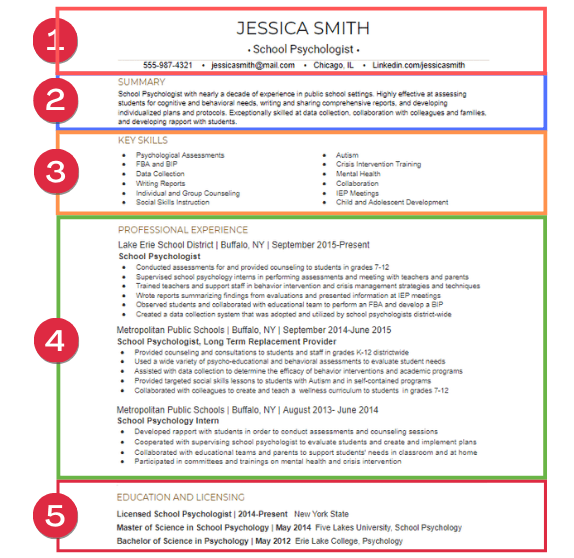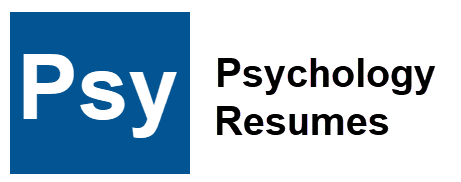Psychology Resume Sample
As you begin to apply for positions in the field of psychology, you will want to consider the information about your education and work experience that you want to highlight in your resume. You want to portray yourself as an educated, experienced, and competent employee who can fulfill the requirements of the job.
Things to Keep in Mind When Writing Psychology Resume
Your resume is your potential employer's first glimpse into you as a professional. You will want to show strong educational preparation, work experience, and a skill set that aligns with the expectations of the position. You will want to make sure your resume is:
- Structured: Follow the standard resume format of listing your most relevant skills, experience and education. Your resume should be one page in length if possible, but no more than two pages.
- Comprehensive: Although your space is limited, especially if you have significant experience, do your best to be very clear and detailed about your specific roles and responsibilities. Your resume should leave no questions about your education or employment history for the reader.
- Intriguing: The goal of your resume is to land an interview, so it is important that it piques the reader's interest. If you have received special training or practiced a methodology that aligns with the employer's practices, be sure to highlight that.
- Consistent: While the content of your resume should stand out, the print style of your words should not. Stick to the standard font and size, and print in black ink.
The resume is your first impression and will tell your potential employer a lot about you as a professional. In order to put your best foot forward, follow these tips to organize your information and highlight the most important details.

Section 1: Your Contact Information
The top section of the resume is the place to list your pertinent contact information. In addition to your name, include your street address, phone number, and email. You can include a professional social media account, such as LinkedIn, if it provides your employer more insight about your capabilities for the open position. You want to make sure that any information shared with the employer in this section is appropriate and professional.

Section 2: The Summary
Below your contact information, write a brief statement that provides an overview of your resume in 2-4 sentences. It should discuss your professional experience as well as your most pertinent strengths and skills for the position to which you are applying. Use the employer's mission statement and the job description to guide the content that you include in this section.

Do not include too much detail in this section. This should serve as a teaser for the skills and work experience sections, where you can discuss the particulars of your work history in depth.
Section 3: Core Skills and Competencies
The subsequent section lists between 12 and 15 skills that you have honed through your education and work experiences. Instead of using complete sentences, put the skills in a bulleted list and use no more than a few words to describe each. This section of the resume should be easy to skim, and anything you note can be addressed further in the work experience portion.

Since the jobs within the field of psychology can vary widely, be sure to read the job posting carefully and tailor the skills to the qualifications and requirements of the position.
Section 4: Professional Experience
The bulk of your resume will be the section outlining your professional work experience. You should list your previous positions in descending chronological order, beginning with your current or most recently held job. Use the same format to list each of your work experiences to make the section easy to read quickly for information. On the first line, include the name of the organization that you worked for, the city and state in which it was located, and then the dates that you worked there, with both the month and year.
The following line should succinctly explain the title of the job that you held . Phrases such as "School Psychologist" or "Professor of Psychology" give the employer a general sense of the type of work that you did and the skills set that you might possess as a result.

Beneath your job title, create a bulleted list of the skills that you developed, as well as your accomplishments within your position. Highlight the responsibilities that are most pertinent to the job for which you are applying. When possible, use action language to describe your roles. For example:
Conducted psychoeducational assessments to determine eligibility for special education services
Collaborated with hospital staff to assess patients and develop a comprehensive treatment plan
Provided Cognitive Behavioral Therapy to individuals with depression and anxiety to treat them with successful outcomes
Take care when creating this section not to list every single job or responsibility that you have held. If you are a more seasoned psychologist, choose the roles and skills that best speak to the requirements of the new position. If you are recently graduated, use your internship and any practicum experiences to build up this section of your resume.
Section 5: Education and Licensure
The last section should note all of your educational experiences, degrees and licensure. Just as you did in the work experience section, list the schools you attended in reverse chronological order, beginning with the most recent and working backward. For each school, include the type of degree that you completed, your major, the name of the college, and year of graduation.

For all positions in psychology, you will need at least a Bachelor's degree with a major in psychology or a related field. Many jobs, especially those involving clinical practice, teaching, or research, will involve a Master's degree or Doctorate. For clinical psychology positions in which you practice counseling and conduct assessments, you will need state licensure as well. Be sure to read the posting carefully and include all of your relevant information in this portion of the resume.
Putting It All Together
One of the most important steps in compiling your resume is reading through it when you are finished. Proofread and make corrections to any errors in format, grammar, or spelling that you notice. After giving it a thorough review, consider asking a friend or colleague to look through it again to make any additional edits.

To help guide your final review, ask yourself these questions:
- Did you use strong, action-based language throughout?
- Were you consistent with the tense?
- Did you use proper grammar from top to bottom?
- Are there area where you could cut out words to make things simpler and easier to understand?
- What bullet points still include unquantified activity? Can you add some numbers to those?
Finally, the BIG question...psychology resume tell your story, clearly and concisely?
If the answer is an unqualified "Yes!" then you should be good to go.
If not, then perhaps now would be a good time to reach out for some professional help.
